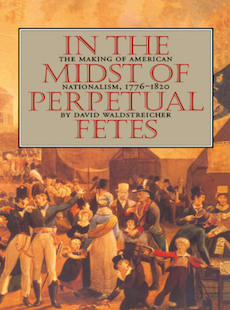
Sensibility and the American Revolution
Sarah Knott
 Publisher: Omohundro Institute
Publisher: Omohundro Institute
Imprint: OIEAHC
Published: 02/2009
Reprint: 2009
Pages: 352
Subject: History, Social Science
Paperback ISBN: 9780807859186
eBook ISBN: 9780807838747
DESCRIPTION
In the wake of American independence, it was clear that the new United States required novel political forms. Less obvious but no less revolutionary was the idea that the American people needed a new understanding of the self. Sensibility was a cultural movement that celebrated the human capacity for sympathy and sensitivity to the world. For individuals, it offered a means of self-transformation. For a nation lacking a monarch, state religion, or standing army, sensibility provided a means of cohesion. National independence and social interdependence facilitated one another. What Sarah Knott calls "the sentimental project" helped a new kind of citizen create a new kind of government.
Knott paints sensibility as a political project whose fortunes rose and fell with the broader tides of the Revolutionary Atlantic world. Moving beyond traditional accounts of social unrest, republican and liberal ideology, and the rise of the autonomous individual, she offers an original interpretation of the American Revolution as a transformation of self and society.
ABOUT THE AUTHOR
Sarah Knott is associate professor of history at Indiana University and coeditor of Women, Gender, and Enlightenment.
REVIEWS
"Sarah Knott's richly cosmopolitan account of the many senses of sensibility in the American Revolution offers a bold and illuminating solution to the urgent challenge of linking social transformation with the reshaping of selves. A landmark in eighteenth-century cultural history tout court."
--David Armitage, Harvard University
"A stimulating book, beautifully edited and produced."
--American Historical Review
"Knott appealingly bridges the two disciplines [18th century history and literature] with her discerning, well-organized analysis. . . . This richly reflective book is a comprehensive and sophisticated study of emotionalism and community."
--Journal of American History
"This is an immensely stimulating book, one with valuable lessons for cultural historians of late eighteenth-century Britain. . . . Knott here achieves a remarkable breadth in constructing her arguments across so many different fields, while at the same time retaining a carefully structured narrative."
--History Workshop Journal
"A luminous, crisply written intellectual history. . . . A masterful book. . . . A book which will, in short order, show us a new way of examining the foundation of American society and culture."
--Journal of Social History
“Ambitious, demanding, and provocative.”
--William and Mary Quarterly
"In tracing the arc of the history of sensibility, Knott gives us a new way of framing the cultural history of the American Revolution. One of the most original, insightful, and provocative works in early American history that I have read in some time."
--Jan Lewis, Rutgers University, Newark
RELATED TITLES














